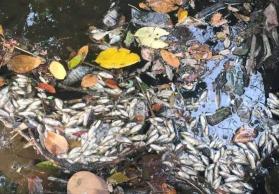Imprisoned Santa Marta Environmentalists Transferred to House Arrest
On August 23, the judge overseeing the case of the five Santa Marta environmentalists who’ve been detained since January ruled that they be transferred to house arrest. This decision represents a significant victory after months of constant struggle by the Social Economic Development Association (ADES Santa Marta) and others in the community, Salvadoran popular movement and human rights organizations, and international solidarity allies.
Concerned by delays in their release given the life-threatening situation in the Salvadoran prison system, the community held a rally on August 31, demanding that the General Directorate of Prisons uphold the judicial order. The five community leaders were finally transferred to their homes early in the morning on September 5, over a week after the deadline for their release. Their health conditions, upon which the petition for their release was ultimately granted, remain unknown as the community works to welcome and accommodate them.
This ruling comes just weeks after the Sensuntepeque District Court granted the Attorney General’s request for an additional six months of pretrial detention to continue to “prepare evidence.” That move delays the trial until at least February 2024, over a year after the five community leaders were originally arrested.The Santa Marta community and its allies continue to call on the Attorney General’s office to drop the charges, citing a host of procedural irregularities and a lack of evidence. Defense lawyers in the case have petitioned for the case to be dropped on the basis that bringing these charges forward violates the National Reconciliation Act of 1992, which provides amnesty for most Civil War-related crimes other than those noted in the 1992 United Nations Truth Commission report and similar war crimes or crimes against humanity.
The international campaign fighting for the release of the five community leaders has intensified in recent months, with seventeen members of the U.S. Congress sending a letter to Secretary of State Anthony Blinken on July 18 urging him to “send a clear, public message calling for their release from pre-trial detention and for the charges against the accused to be dismissed.” A U.N. Special Rapporteur on Human Rights Defenders previously published an official request for their release, expressing grave concerns about the detention of the environmental leaders. The Santa Marta legal team has also appealed to international bodies, most recently by presenting the case at an Inter-American Commission on Human Rights hearing on the “Human Rights Situation in El Salvador in the Context of the State of Emergency.”
Vidalina Morales, the president of the Association of Economic and Social Development (ADES) of Santa Marta, in a speech immediately following the August 23rd ruling, expressed gratitude to their supporters. “To the organizations who have stood in solidarity with Santa Marta and ADES, inside and outside the country, we are infinitely grateful for your support. And we ask you to continue accompanying us until we achieve a definitive victory in this fight. We will continue with legal actions until we reverse this unfair criminal process against our community leaders.”
Both the Congressional letter to the State Department and the U.N. statement express concern that these leaders have been targeted as part of a wider plan to overturn the historic ban on metallic mining in El Salvador, which was passed in 2017. The Santa Marta community and ADES were leaders of that hard-fought victory, in which at least three environmental activists lost their lives.
Beyond these troubling arrests, the Santa Marta community has denounced increased military activity in their community, within the context of President Bukele’s indefinite nationwide State of Exception, ostensibly as part of his “war on gangs.” At the beginning of August, the government deployed 7,000 military and an additional 1,000 police to the department of Cabañas. This military siege has disproportionately focused on historically organized communities, including Santa Marta, where tanks occupied the streets of the small community until last week.
The arrests and militarization of Santa Marta point to a general trend of militarization in the country and also to how historically organized communities have been particularly impacted. Cinquera, also in Cabañas, recently had its school and community center turned into temporary military barracks, a community that, like Santa Marta, was also violently persecuted during the armed conflict by El Salvador's military. The community of Guajoyo, Tecoluca, in San Vicente, which remains entrenched in a diversity of land struggles (including a legal battle over agricultural lands they received land titles for as part of the Peace Accords) has denounced the continued persecution they have faced, including the setting up of a military outpost this past August 11.
The struggle to free the Santa Marta community leaders is just one front in the battle to defend hard fought environmental and land defense victories, and it is far from over. Their supporters remain vigilant, as they refocus their efforts on the broader legal battle. As Videlina Morales summed it up outside of the courthouse last week, “Today, we celebrate this step as families, as a community, and as organizations, but the definitive, final step will be when our compas are totally and unequivocally freed.”

 "I am a CISPES supporter because continuing to fight for social justice and a more people-centered country means continuing the dream and sacrifice of thousands of my fellow Salvadorans who died for that vision.” - Padre Carlos, New York City
"I am a CISPES supporter because continuing to fight for social justice and a more people-centered country means continuing the dream and sacrifice of thousands of my fellow Salvadorans who died for that vision.” - Padre Carlos, New York City

